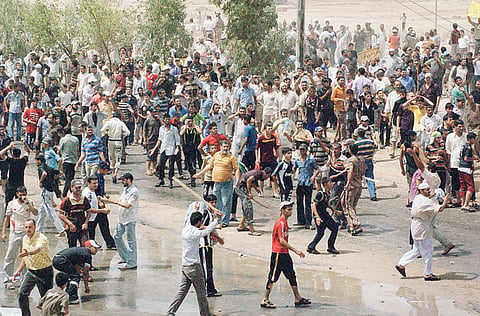Al Maliki grapples with power crisis
Frayed nerves begin to show as demonstrations over outages turn violent

Baghdad: Iraqis' tempers are rising over their government's failure to provide reliable electricity. And their thermometers have topped 48 degrees Celsius.
Billions of dollars have been spent trying to fix the grid since the 2003 invasion, but many Iraqis still get less than six hours of electricity per day — about the same or sometimes even less than they received under Saddam Hussain.
Fears that frustration could lead to bloodshed were realised on Saturday in the hot and humid southern oil port of Basra, where two protesters were killed after a demonstration over power outages turned violent, prompting security forces to open fire.
The crisis has already led to the electricity minister's resignation and poses a major test for Prime Minister Nouri Al Maliki as he struggles to keep his job amid bickering over the formation of a new government more than three months after national elections.
It also complicates efforts to stabilise the country as the US military prepares to withdraw its forces by the end of next year.
‘False promises'
"The current government has had four years to build and rehabilitate the power stations, but apparently the officials did not nothing but make false promises," said Ali Sami, a Baghdad taxi driver who had to take his baby to the doctor for a heat rash last week.
"It is clear that billions of dollars were spent on nothing in this country."
Sami said his household has been averaging only about an hour a day of city electricity, compared with about 10 hours per day last summer.
He pays about $100 (Dh367) per month to tap into the neighbourhood generator, which provides enough energy to keep the lights on and run some appliances, but the family has spent many sleepless nights on the rooftop.
Even hospital patients have been sleeping outside in Basra, though those who are not mobile must endure the sweltering night indoors.
Riyadh Abdul Wahid, the head of Basra Health Directorate, said the hospitals had been connected to an emergency line that kept power running but officials were forced to take them off line last week.
The facilities have generators, but only enough to keep the lights and medical machines running.
Al Maliki dispatched a delegation to Basra and urged Iraqis to be patient.
"You should not expect to solve the power crisis soon. It will take two years at least," he said on Tuesday at a press conference. "We will give priority to the electricity sector in the next government."
Al Maliki's State of Law list has joined forces with a hardline Shiite religious party in a bid to gain control of the parliament after the Sunni-backed Iraqiya list won the most seats in the election.
However, the factions remain divided over who should be prime minister and hold other posts in the next government. Iraqis have suffered from power shortages for decades as the infrastructure suffered from neglect brought on by wars and UN trade sanctions under Saddam.
Most of the country received an estimated four to eight hours of power per day under Saddam, though Baghdad residents got 16 to 24 hours per day.
Do you think four years is enough time to improve the power problem in Iraq? Were Iraqis better off under Saddam’s regime? What could be done as a temporary fix?



